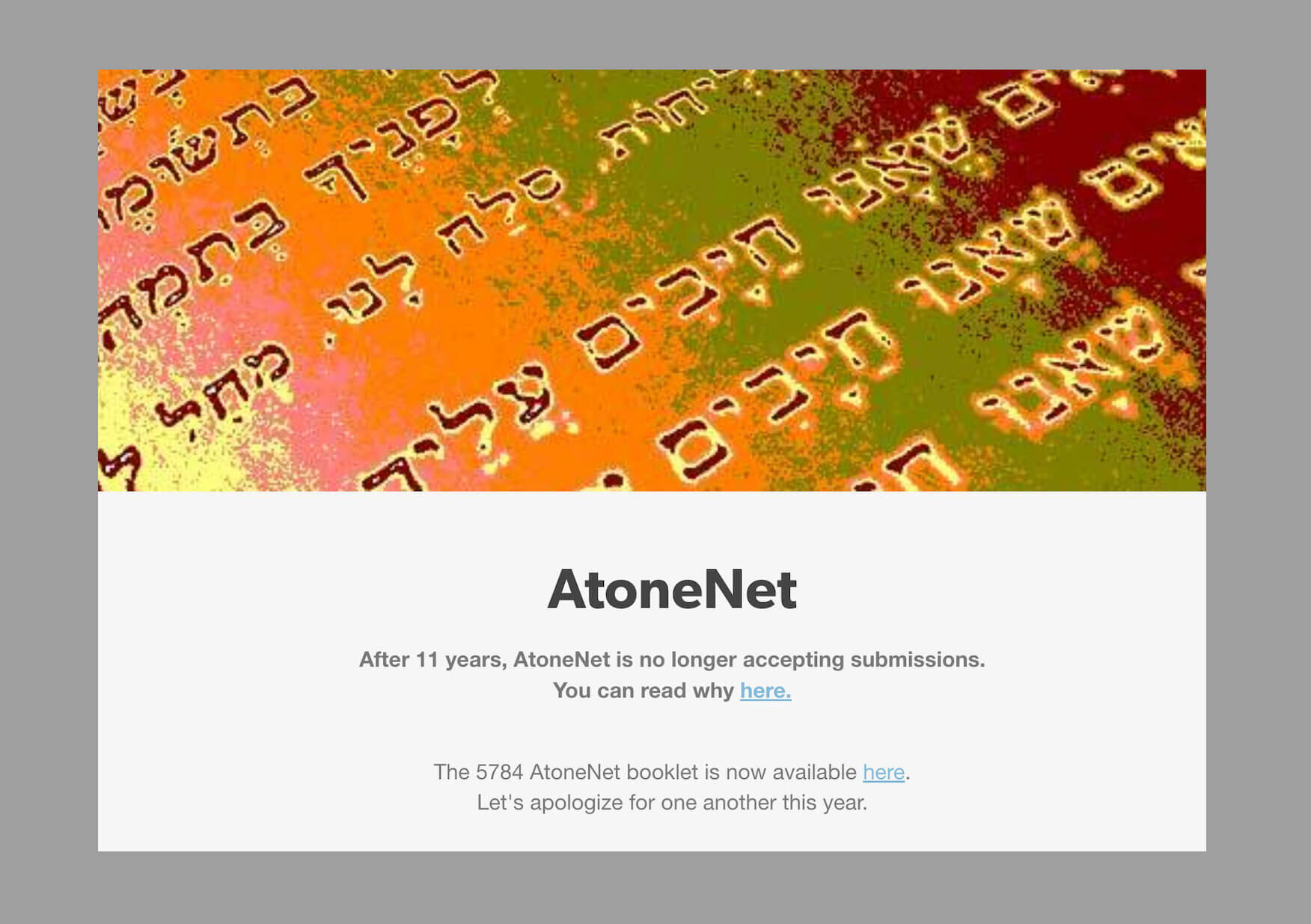How the closing of a website for Yom Kippur confessions explains the internet
The death and life of AtoneNet, a living tapestry of Jewish guilt

On AtoneNet, people anonymously confessed their sins. “Let’s apologize for one another,” the website said. Image by screengrab
For 11 years, a website asked visitors a single question: What do you want to ask forgiveness for?
The website, AtoneNet, posted the responses — no names attached — for public perusal, and before Yom Kippur, the Jewish Day of Atonement, published a pamphlet compiling them. Printed out and tucked inside a holiday prayer book, the community’s confessions gave the liturgy — and the act of repentance — a 21st-century refresh and personalized feel.
The confessions were often moving, and always human — until, one day last year, they weren’t. David Zvi Kalman, who created and manages the site, said this week that AtoneNet has stopped accepting submissions — and thus, is ceasing operation — because artificial intelligence made them impossible to authenticate.
“It’s no longer possible for me to tell whether they correspond with real human confessions,” Kalman, a fellow at the Shalom Hartman Institute and occasional contributor to the Forward, wrote in a blog post explaining the decision. “Users of the site, too, can now justifiably read the site’s anonymity policy as a reason not to trust what they see there.”
What Kalman’s humble little website experienced reflects a transformation happening across the internet. The widespread accessibility of large language models like ChatGPT has flooded online spaces with “slop” — the term for unwanted AI-generated content — making the authentic stuff harder to discern. AtoneNet is far from the only casualty.
Inscribed in the book
Kalman, who studies the intersection of religion and technology, started the website in 2013 as a response to the vidui, the confessional prayer Jews recite on Yom Kippur, often beating their chests as they state each transgression. The liturgy renders the collective sins broadly — those committed through speech, for example, or by using coercion — in a way Kalman, now 37, saw as too abstract.
“If you listen to people actually apologize using their own words, it sounds pretty different from the words you might see in the prayer book,” he said in an interview. “That makes the prayer book feel more distant than it otherwise would.”
Submissions to AtoneNet, on the other hand, were intimate — and immediate, producing a living tapestry of Jewish guilt. At turns scandalous (“stepping outside of my marriage”), familiar (“being impatient with my son”) and specific (“for still being frustrated at my mom for being deaf after 33 years”), they tended to capture the foibles of modern life (“thinking Facebook debates could be ‘won'”) and the reckonings of greater society (“doubting democracy instead of getting involved in democracy”).
Scroll through them, and you’d likely find one you could have written yourself.
They changed over the 11-year life of the site, Kalman told me. After the Black Lives Matter protests in 2020, for example, many people confessed racial prejudice. During the pandemic, one person apologized for begrudging their kids’ coping through TikTok.
Altogether there were hundreds of responses, enough for Kalman’s printable booklet to contain five sections — corresponding to Yom Kippur’s five prayer services, each of which contain the vidui — with dozens of confessions in each. Kalman said numerous people told him they brought it with them to shul on the holiest day of the year.
If AtoneNet’s death by AI is a marker of today’s internet, its birth was a signpost of a different time. It was hosted on Tumblr, a blogging platform whose built-in question box feature made it a darling of the early aughts, when the anonymity of the internet seemed more freeing than dangerous. The vulnerability of early submissions didn’t surprise Kalman — the internet was just like that back then.
“People are actually willing to be quite raw online with many aspects of their life,” he noted. “Especially if their name isn’t attached to it.”
Who (or what) shall live?

Kalman had planned to run AtoneNet forever — as long as there were sins to confess. But a few months ago, Kalman noticed something uncanny about the submissions: A flurry had come in around the same time, and their tone was odd.
“I was like, wait a minute, somebody might be using this site as a way to test out answers to a prompt,” he recalled.
The site’s fate was sealed: No new pamphlet for the Jewish year that started last week, 5785. (You can still download 5784’s; many sins — “skipping shul on Shabbat,” say, or “avoiding calling my dad” — are perennial.)
Other websites have run into similar problems. New York Magazine described earlier this year how slop had forced the science fiction magazine Clarkesworld to put user submissions on hold. Forums that depend on anonymous confessions have long been undercut by skepticism that posts are made up — now members wonder whether a person wrote them at all. Social media platforms like Facebook and X have become overwhelmed with content — including malicious disinformation — posted by bots running on language-learning models.
People mourning the end of the pre-AI internet are holding onto the hope that slop will eventually become so widespread that people return to the real world to get away from it. Kalman is one of them.
And for what it’s worth, he didn’t seem too torn up about the death of his project.
“One of the traps that people can get into, is you have these amazing innovations, and then they kind of calcify,” he said. “Like, ‘That innovation was so good, let’s just do it that way forever.’ And that’s a terrible model. I think it’s good to continually reinvent ideas.”

















